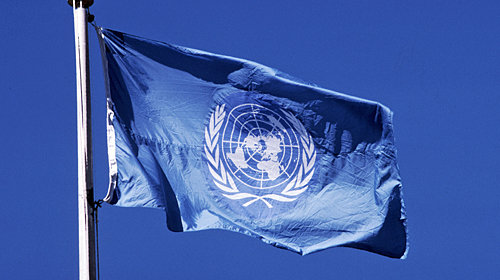
The eyes of the international community will be focused on the United States this week. Government representatives will appear before the U.N. Committee against Torture to defend U.S. compliance with the anti-torture treaty the United States ratified 20 years ago.
This marks the first U.N. review of the United States' torture record since President Obama took office in 2009, and much is at stake. The review will test the pledges President Obama made to reverse disastrous Bush-era policies that led to gross violations of human rights, like torture, secret and incommunicado detention, "extraordinary renditions," unfair trials, and more. It is also likely to examine practices that emerged or became entrenched during Obama's time in office, such as indefinite detention at Guantánamo, immigration detention and deportations, and the militarization of the police, as witnessed by the world during this summer's events in Ferguson.
As we have previously written, in order to meet international torture-prevention standards, the Obama administration must first unequivocally repudiate the Bush administration's dangerous and wrong position that the ban on cruel treatment doesn't apply when the United States is operating abroad. Doing so will help break with the abusive and illegal practices of the past and strengthen the global prohibition against torture and ill-treatment enshrined in the . The president should heed calls by (D-Vt.); ; human rights groups; and even his former State Department , all of whom who asked him to endorse the extraterritorial application of the convention as a matter of legal obligation, not only policy.
The U.S. delegation on Wednesday will be emphasizing the president's actions to close secret CIA detention facilities and prohibit the use of any interrogation technique not authorized by and listed in the Army Field Manual on human intelligence. But the U.N. Committee against Torture is likely to ask about loopholes or gray areas where U.S. policies are still not in full conformity with the convention.
For example, the committee is also likely to ask the U.S. delegation to explain how Appendix M to the Army Field Manual, which authorizes the use of interrogation techniques – such as "separation," sleep deprivation, and sensory deprivation – are consistent with the anti-torture treaty. Another issue that will be at the center of the U.S. review is the fact that President Obama's on the prohibition of CIA detention is not absolute. The order contains a loophole that allows the CIA to operate detention facilities so long as those facilities are "used only to hold people on a short-term, transitory basis." As we said in our own report to the U.N. committee, there is currently no publicly available directive establishing parameters for such "short-term" and "transitory" detention operations. This absence, coupled with the secret nature of CIA covert operations, creates the possibility of continued CIA overseas detention facilities, sometimes described as "black sites," in an altered form.
The U.S. delegation will also be asked to explain many domestic policies and practices at the that are not in full compliance with the treaty, particularly the obligation to prevent acts of cruel, inhuman, or degrading treatment or punishment. More than 65 alternative reports and submissions were made to the committee, many of them coordinated by the . The submissions cover many issues that the committee is likely to take up at the review on Wednesday and Thursday, including issues raised by the ACLU report:
- Militarization of policing, racial profiling and excessive and lethal use of force by law enforcement, such as the fatal shootings of Mike Brown in Missouri and Milton Hall in Michigan;
- Abusive prison conditions and use of solitary confinement, including against children and people with mental disabilities;
- Inhuman detention and summary deportation of immigrants and asylum seekers, including the expansion of family detention and failure to provide legal representation even for migrant kids;
- The deficiencies in the death penalty system, including cruel and inhuman practices, such as death row phenomena and lethal injections using untested and unapproved drugs in shroud of secrecy;
- Extreme and disproportionate sentencing schemes, such as imposing life without parole sentences, including against juveniles.
This week, the president has yet another opportunity to take action to end torture and cruelty at home and abroad. He can start by instructing the U.S. delegation to firmly and equivocally reject fabricated loopholes, affirm the global reach of U.S. obligations under the convention, and take concrete transparency and accountability measures to prevent torture and abuse from happening.
The world will be watching.
Watch the live webcast at 4 a.m. EST on Wednesday and 9 a.m. EST on Thursday.
Learn more about torture and other civil liberties issues: Sign up for breaking news alerts, , and .

